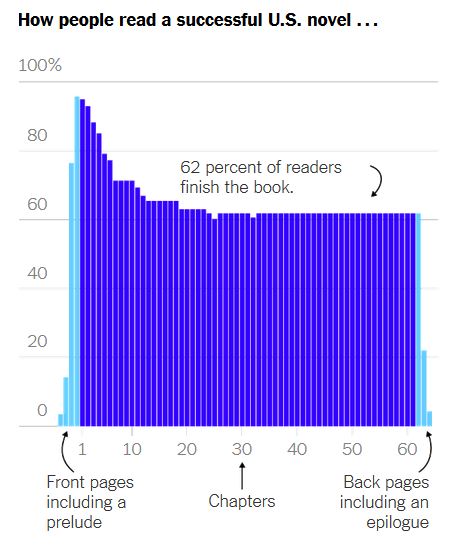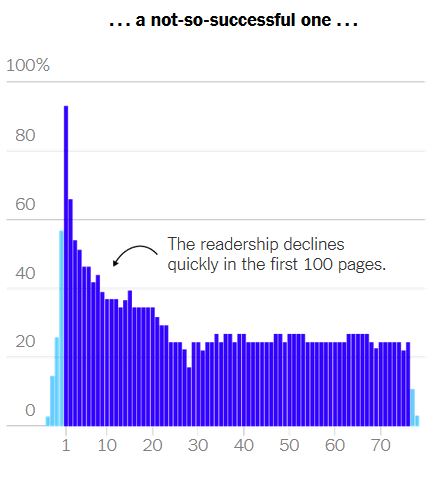 The eBook has been with us for nearly two decades. Without it, we would not have seen the explosion of self-published authors as we have. In fact, many of us wouldn’t be reading this right now if it weren’t for eBooks. While eBooks have become ubiquitous in our society, we don’t really know much about the behavior of eBook readers.
The eBook has been with us for nearly two decades. Without it, we would not have seen the explosion of self-published authors as we have. In fact, many of us wouldn’t be reading this right now if it weren’t for eBooks. While eBooks have become ubiquitous in our society, we don’t really know much about the behavior of eBook readers.
The New York Times published an interesting article the other day regarding the habits of eBook readers. A reader analytics company, Jellybooks, provided the data from thousands of readers to determine some basic characteristics of how we consume our eBooks.
In the study, information collected included when people read, how long they read, and how far into the book they read. Jellybooks collected data from books published by seven publishers, including one major American publisher. Unfortunately, they were not able to analyze data from self-published titles.
Here’s what they found …
- Less than half the books tested were finished by the majority of the readers.
- Most readers gave up on a book in the early chapters.
- Women tended to quit after 50 to 100 pages.
- Men tended to quit after 30 – 50 pages.
- Only 5% of the books tested were completed by 75% of the readers.


What does all this mean for us?
It’s difficult to translate information from big publishers to self-pub, however, in this research, the eBooks were given away for free in order to allow the researchers access. Certainly, the data could be skewed as a result of receiving a free eBook. With that being said, free or inexpensive copies of our books are one of the main methods of marketing our own eBooks. We all know that people load up their Kindle with free books and never read them.
(As a side note, I recently received a tweet from someone who had The Card on his Kindle for almost two years and just got around to reading it and loved it!)
Overall, the data does suggest certain trends. Readers make up their mind in the first 50 to 100 pages. As for an eBook, they don’t have any trouble moving on if they don’t like it. Interestingly, Amazon confirmed the same findings to the researchers. With that in mind, the reader analytics indicate that completion rates are driven by characters, narrative, tone and other similar factors. That’s good news for us!
The concern when reader analytics are involved, is that data will be used to determine the fate of a story. If we were all in the position to “focus group” our books, we might get a benefit out of data analytics. Otherwise, it doesn’t play a big role in self-publishing. In the end, readers still determine what they like. If you write a great story — people will read it.
There are several reasons we, indie authors, have moved into self-publishing — freedom, shelf-life, time to press, royalties and more. We may now have another reason. If big publishers start to engage in these data analytic experiments, they might use it to determine where and how they spend marketing dollars. They might get even more involved in the editing process and even use the numbers to determine if they should continue to back a book before it is published.
With books, just as we’ve seen in blockbuster movies, the shift to data analytics could lead to cookie cutter, generic-sounding literature. Data should not drive the creative process. The idea of self-publishing has just gotten a little sweeter. The future of great stories, fantastic literature, and a diverse selection of books may depend on it.

This, IMHO, also speaks to price. e-books are cheaper than print, so readers are more likely to take a chance on a new author. On the other hand, cheap also means there is less incentive to stick it out and read the entire book.
You hit the nail on the head. I know that in the past, I would hardly, if ever, stop reading a book. Now I don’t hesitate … maybe it’s because the investments is less, or the writing has gotten worse, or I don’t have time to waste on a bad book!
I’m surprised that so few people finish a book. Well, putting that aside, publishers using analytics will more easily churn out “focus-grouped” books for the masses. I would love to know the ages of the readers in these stats. I suspect they’re younger people who, through instant-gratification experiences with internet games and so forth, won’t invest time in a novel’s development. We’ve all seen the same thing happening with movies and TV shows.
Candace, I could not locate the age of the readers, although they used seven publishers and a variety of book types. I would imagine that there was a cross section of age groups. Thanks for the question, it’s worth looking into.
This only underscores the importance of hooking a reader in the first chapter. Not an easy thing to do, apparently.
You’re right Bruce, it sure does. Not to mention having a solid beta reader group that can bring honest feedback in helping you get it right from the outset.
Good article, very insightful: To bad we will never know what percentage were a first time author, and if the 60% read through rate were well known authors with multiple titles. I followed the link to the original NY Times article and there is a 3rd chart showing what happens if you do not market your book. It confirmed that if you do not market your book then you get 10% starting your book with virtually no one finishing it, which I thought was a bit odd. In any event I guess you better get your e-mail newsletter distribution list up to date, and carefully choose your marketing methods wisely to get the word out about your books, if you want to sell books. Don’t sit on your duff and do nothing or you will be in the bottom 10% with declining sales.
Thanks, Joe.
And thanks for looking deeper. I didn’t include the third chart because it doesn’t apply to us as much.
You might have misinterpreted that third chart. What that demonstrated was a publisher that pulled back marketing on a title that they had paid big bucks for after they saw the data that showed 90% of the readers had left after the 5th chapter. So it was really a knee-jerk reaction based on the data.
Likewise, there was an example of a debut novel that more than 70% of the readers were finishing and that publishing company added to the marketing campaign for that title.
Regardless, we as indies know that books don’t sell themselves. You’re spot on about the email newsletter distribution list.
They keep turning out cookie-cutter movies, some of which bomb, and then an indie movie comes along a blows everyone out of the water. Same with books. Creativity is far from lost!
Agreed, thanks Gordon.
“The future of great stories, fantastic literature, and a diverse selection of books may depend on it.”
Spot on, Jim!
Thanks, AC. your the best.
Interesting. I guess hooks are more important than ever to keep a reader engaged and reading.
Yep, couldn’t agree with you more. One NYT bestselling author that I consider a mentor said to me, “Get from A to Z. Don’t go from A to B to C …”
You get the picture.
Thanks Kathy
Very thought provoking Jim. Thank you for posting this. Loved the comment go from A to Z.
Thanks, Vicky. I appreciate the comment!